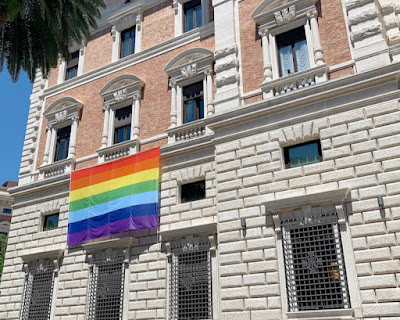Thus the title I would give to the great Jordan Peterson 2022 Hillsdale College Commencement Address below.
To elaborate on the Magisterium of the Catholic Church is our mission on Plinthos (Gk. "brick"); and to do so anonymously, so that, like any brick in the wall, we might do our little part in the strength of the structure of humanity almost unnoticed.
Tuesday, June 28, 2022
Secular Magnanimity: A Perfect Christian Virtue
Monday, June 27, 2022
Pro-Life Victory on Jesus' Feast Day
Friday, June 24th (the Birthday of Saint John the Baptist), The Feast of the Sacred Heart of Jesus, less than a year before the 50th anniversary of the January 22nd, 1973 Supreme Court decision legalizing abortion Roe VS. Wade, Dobbs VS. Jackson overturns that decision. Here is the new law, unabridged, which is worth reading.
The United States of America now needs to enact an additional law defending every unborn human being, from the moment of conception, acknowledging the natural right to life by enshrining it in law. The child in the womb has the same God-given right to life as any other man that is born. That right is enshrined in The Declaration of Independence of the United States of America, "We hold these truths to be self-evident, that all men are created equal, that they are endowed by their Creator with certain unalienable Rights, that among these are Life, Liberty and the pursuit of Happiness." Every man in the womb must therefore be defended by the law of the land. Procured abortion, the direct and deliberate killing of an unborn human being, is against the law which forbids homicide. Of course, an anti-abortion would necessarily extend also to prohibit all abortifacient contraceptives.
"The health of the mother" should provide no exception to this law, because any pathology of the mother must be treated with equal consideration for the life of the unborn man, while maintaining the integrity of the principle of double effect and, therefore, not directly or deliberately harming the child.
All men of good will must demand the complete outlawing of abortion. Every unborn man has a right to be defended by the law.
Sunday, June 26, 2022
Chaste Relations = Marital Magnanimity
There was a lecture on magnanimity during the last day of the Sacra Doctrina Project 2022 Annual Conference in which the speaker referred to the frequently overlooked passage of Humanae Vitae, 21.
In the context of Natural Family Planning's periodic continence, the Encyclical indicates the magnanimous nature of marital chastity. This passage should preached by priests to highlight the sanctity of marital love because it emphasizes the human excellence, grandeur and superlative achievement of marital magnanimity, which is expressed and fostered by marital chastity, in the wholesome integrity of holy marital relations.
The right and lawful ordering of birth demands, first of all, that spouses fully recognize and value the true blessings of family life and that they acquire complete mastery over themselves and their emotions. For if with the aid of reason and of free will they are to control their natural drives, there can be no doubt at all of the need for self-denial. Only then will the expression of love, essential to married life, conform to right order. This is especially clear in the practice of periodic continence. Self-discipline of this kind is a shining witness to the chastity of husband and wife and, far from being a hindrance to their love of one another, transforms it by giving it a more truly human character. And if this self-discipline does demand that they persevere in their purpose and efforts, it has at the same time the salutary effect of enabling husband and wife to develop to their personalities and to be enriched with spiritual blessings. For it brings to family life abundant fruits of tranquility and peace. It helps in solving difficulties of other kinds. It fosters in husband and wife thoughtfulness and loving consideration for one another. It helps them to repel inordinate self-love, which is the opposite of charity. It arouses in them a consciousness of their responsibilities. And finally, it confers upon parents a deeper and more effective influence in the education of their children. As their children grow up, they develop a right sense of values and achieve a serene and harmonious use of their mental and physical powers. Humanae Vitae, 21.
Wednesday, June 15, 2022
Marital Fidelity in the Odyssey
"The Trunk of the Olive Tree": The 'Testing of the Bed' As a Symbol of Fidelity and Like-mindedness in Homer's The Odyssey by Erin Whittemore
The old nurse went upstairs exulting. to tell the mistress of her lord's return, and cried out by the lady's pillow: "Wake, wake up, dear child! Penelope, come down, see with your own eyes what all these years you longed for! Odysseus is here! Oh, in the end, he came! And he has killed your suitors, killed them all Penelope said: "I am stunned, I cannot speak to him. I cannot question him. I cannot keep my eyes upon his face. If really he is Odysseus, truly home, beyond all doubt we two shall know each other better than you or anyone. There are secret signs we know, we two." Homer's The Odyssey, Book 23 (lines 1-10, 119-125)
Tuesday, June 7, 2022
Music for the Octave of Pentecost
This is one of the first records I ever owned, from Seton Hall University Library discard in the late 1980's.
It is a sublime delight to pray this Exodus Psalm every evening this week in my priestly canonical prayer of the Church, thanks to Summorum Pontificum! Deo gratias!
Psalm 113 - In Exitu Israel
I. Double-Choir Introduction
1. In exitu Israel de Aegypto, /domus Iacob de populo barbaro
2. Facta est Iudaea sanctificatio eius, /Israel potestas eius.
3. Mare vidit et fugit, /Iordanis conversus est retrorsum.
4. Montes exultaverunt ut arietes /et colles sicut agni ovium.
IIa. Soprano Recitative
5. Quid est tibi mare quod fugisti, /et tu Iordanis quia conversus es retrorsum?
IIb. Soprano Aria
6. Montes exultastis sicut arietes /et colles sicut agni ovium?
III. Bass Aria
7. A facie Domini mota est terra, /a facie Dei Iacob /qui convertit petram in stagna aquarum /et rupem in fontes aquarum.
IV. Double-Choir
8. Non nobis Domine, non nobis /sed nomini tuo da gloriam /super misericordia tua et veritate tua.
9. Nequando dicant gentes: Ubi est Deus eorum?
V. Double-Choir
10. Deus autem noster in caelo /omnia quaecumque voluit fecit.
11. Simulacra gentium, argentum et aurum, /opera manuum hominum.
12. Os habent, et non loquentur, /oculos habent et non videbunt,
13. aures habent, et non audient, /nares habent, et non odorabunt.
14. Manes habent, et non palpabunt, /pedes habent, et non ambulabunt, /non clamabunt in gutture suo.
15. Similes illis fiant qui faciunt ea, /et omnes qui confidunt in eis.
VI. Trio: Contralto, Tenor and Bass
16. Domus Israel speravit in Domino, /adiutor eorum et protector eorum est.
17. Domus Aaron speravit in Domino, /adiutor eorum et protector eorum est.
18. Qui timent Dominum speraverunt in Domino, /adiutor eorum et protector eorum est.
19. Dominus memor fuit nostri, /et benedixit nobis, /benedixit domui Israel, /benedixit domui Aaron,
20. benedixit omnibus qui timent Dominum, /pusillis cum maioribus.
VIIa. Tenor Recitative
21. Adficiat Dominus /super vos et super filios vestros.
VIIb. Tenor Aria
22. Benedicti vos a Domino /qui fecit caelum et terram.
23. Caelum caeli Domino /terram autem dedit filiis hominum.
VIIIc. Double-Choir
24. Non mortui laudabunt te Domine, /neque omnes qui descendunt in infernum,
IX. Double-Choir, connected to preceding
25. sed nos qui vivimus benedicimus Domino, /ex hoc nunc et usque in saeculum.
X. Choir, With Soprano Solo
Gloria Patri, et Filio et Spiritui Sancto.
XI. Double-Choir
Sicut erat in principio, et nunc, et semper/ et in saecula sæculorum. Amen.
Monday, June 6, 2022
Huge Rainbow Flag Flies at US Embassy to the Holy See
Sunday, June 5, 2022
The Scandal of Sodomite Cardinals
The Code of Canon Law, Canon 351.1 says that Those to be promoted as Cardinals are to be "men who are truly outstanding in doctrine, virtue, piety and prudence in practical matters."
How can any priest, let alone a Cardinal, in light of that requirement, condone Sodom? But ambiguity is the scandalous standard of the Pope Francis appointed College of Cardinals, a procession of doctrinally and morally ambivalent men. Many show themselves to be friends, if not outright sons, of Sodom.
Everything I need to know I learned in the elementary school Basic Catechism. According to the Basic Catechism of Christian Doctrine there are nine ways in which we cause or share the guilt of another's sin:
1. By counsel
2. By command
3. By consent
4. By provocation
5. By praise or flattery
6. By concealment
7. By being a partner in sin
8. By silence
9. By defending the ill done.
Ever recall the word of God:
"I marvel that you are so quickly deserting him who called you to the grace of Christ, changing to another gospel; which is not another gospel, except in this respect that there are some who trouble you, and wish to pervert the gospel of Christ. But even if we or an angel from heaven should preach a gospel to you other than that which we have preached to you, let him be anathema! As we have said before, so now I say again: If anyone preach a gospel to you other than that which you have received, let him be anathema! For am I now seeking the favor of men, or of God? Or am I seeking to please men? If I were still trying to please men, I should not be a servant of Christ."
Galatians 1:6-10, Challoner-Rheims Confraternity Edition New Testament, Saint Anthony Guild Press: Paterson, NJ, 1947.
Come Holy Spirit and send the purifying fire which you once sent on Sodom to purge the world, beginning with the Church, of every stain of impurity.




